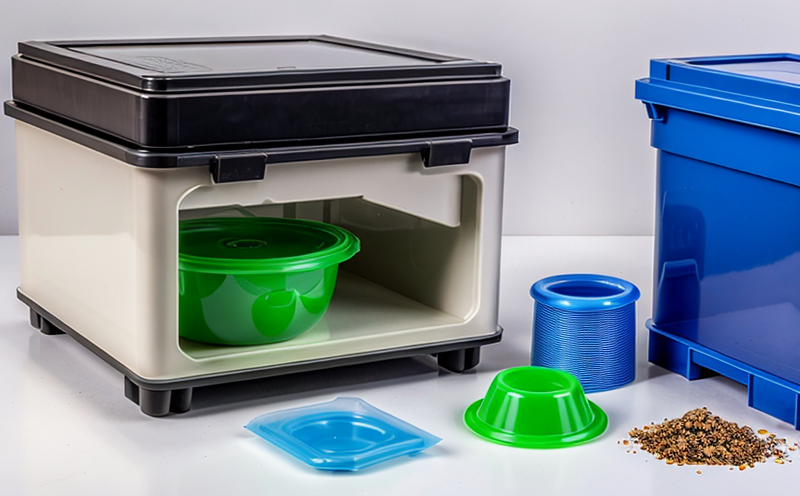ISO 1133 Plastics Packaging Melt Flow Index Testing
The melt flow index (MFI) is an essential parameter that measures a plastic's ability to flow under pressure. In the context of packaging plastics, this test provides critical insights into the material’s processability and performance during manufacturing processes such as extrusion blow molding or injection molding.
ISO 1133 specifies the procedure for determining the melt mass flow rate of thermoplastics. This parameter is particularly important for quality managers, compliance officers, R&D engineers, and procurement teams who are responsible for ensuring that packaging materials meet specific performance criteria. The test is widely used to evaluate the consistency of raw material batches, optimize processing conditions, and ensure product reliability.
The MFI test involves extruding a sample through a die under controlled temperature and load conditions, measuring the weight of plastic extruded in a given time interval. This value is then converted into MFI units (g/10 min). The higher the MFI, the easier it is for the material to flow during processing.
For packaging plastics, understanding MFI can help in selecting materials that are suitable for specific applications. For instance, a high MFI might be preferable for thin-walled containers where processability and ease of extrusion are critical. Conversely, a lower MFI may be more appropriate for thicker sections to ensure the material has sufficient strength.
The test is crucial for compliance with international standards such as ISO 1133:2017, which provides detailed procedures for conducting the test accurately. Compliance officers must ensure that their testing protocols align with these standards to maintain market access and meet regulatory requirements.
Quality managers often use MFI data to monitor process consistency and identify potential issues early in the production cycle. By tracking changes in MFI over time, they can adjust processing parameters or raw material specifications as needed.
R&D engineers rely on MFI testing to innovate new packaging materials that balance performance with cost-effectiveness. They may explore blends of different polymers or additives aimed at optimizing flow characteristics without compromising other critical properties like strength and durability.
Procurement teams can leverage MFI data to source raw materials from suppliers who consistently deliver high-quality products meeting stringent specifications. This ensures that the final packaging meets all performance requirements, contributing to customer satisfaction and regulatory compliance.
Applied Standards
The ISO 1133 standard is widely recognized for its precision in measuring melt flow index, making it a key reference for quality assurance in the plastics industry. It specifies both extrusion and injection methods for determining MFI under controlled temperature and load conditions.
The extrusion method involves heating the sample to the specified temperature, applying a constant load, and measuring the mass of plastic extruded through the die over five minutes. The result is expressed as grams per 10 minutes (g/10 min).
The injection method uses an injection molding machine to inject the heated sample into a mold cavity at a controlled pressure and temperature. The weight of material injected during a specified time interval determines the MFI.
Both methods provide valuable insights, but they are used depending on the specific application requirements or testing capabilities available. Compliance officers must ensure that their laboratories use the appropriate method based on industry standards and regulatory expectations.
Scope and Methodology
| Parameter | Description |
|---|---|
| Temperature | The temperature at which the sample is heated, typically between 190°C to 230°C depending on the polymer type. |
| Load | The weight applied to the die during extrusion testing, usually in the range of 5 kgf to 10 kgf for most packaging plastics. |
| Time Interval | The duration over which the mass is measured, set at five minutes for ISO 1133 compliance. |
| MFI Units | The result of the test expressed in grams per 10 minutes (g/10 min). |
| Sample Preparation | Cylindrical specimens are cut from extruded samples, ensuring uniform thickness and diameter. |
| Mold Cavity Volume | The volume of the mold cavity used in injection molding tests, typically standardized for each polymer type. |
Testing adheres strictly to ISO 1133:2017, which ensures consistency and accuracy across different laboratories. The extrusion method is preferred for its simplicity and repeatability, while the injection method allows for more precise control of melt temperature and pressure.
The methodology involves several critical steps:
- Sample preparation
- Heating to the specified temperature
- Application of a constant load on the extrusion die or injection molding machine
- Measurement of mass flow over five minutes for both methods
- Data interpretation and reporting in accordance with ISO standards.
The results are reported as MFI values, which can vary significantly based on temperature and load settings. Compliance officers should ensure that all tests follow the prescribed conditions to avoid discrepancies and ensure accurate comparison between batches or suppliers.
Eurolab Advantages
EuroLab offers a comprehensive suite of services for plastics packaging testing, including ISO 1133 MFI testing. Our advantages include:
- Expertise and Experience: Our team comprises highly qualified professionals with extensive experience in polymer testing.
- State-of-the-Art Facilities: We are equipped with the latest equipment, including advanced extrusion and injection molding machines compliant with ISO 1133:2017 standards.
- Comprehensive Reporting: Our reports provide detailed insights into MFI values under different conditions, helping clients make informed decisions.
- Rapid Turnaround: We offer fast turnaround times to meet tight project deadlines without compromising quality.
- Regulatory Compliance: Our testing protocols ensure strict adherence to international standards like ISO 1133:2017, ensuring market access and regulatory compliance.
- Customer Support: Our dedicated team provides personalized support throughout the testing process, from sample preparation to final report generation.
EuroLab's commitment to excellence ensures that our clients receive reliable, accurate, and timely results. This aligns with the needs of quality managers, compliance officers, R&D engineers, and procurement teams who rely on robust data for decision-making.





